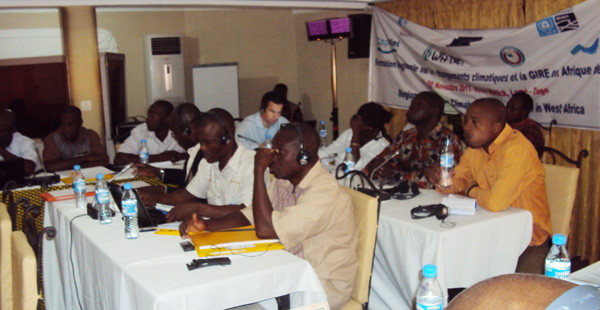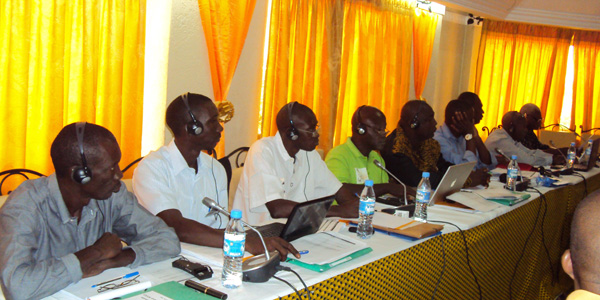The meeting took place from November 21 to 25, 2011 in Lome, Togo and brought together 21 participants of seven (7) countries covered by the ACP / EU project " Improving Water Management and Governance in African Countries through support in development and implementation of IWRM Plans”'. Countries are Côte d'Ivoire, Gambia, Guinea, Guinea Bissau, Liberia, Sierra Leone and Togo. Each country was represented by three (3) members including two (2) from the Ministry of Water and a representative of the Country Water Partnership (CWP) process.
High quality communications were made by the facilitators of the of the West African network on Capacity Building in IWRM (Wanet affiliated to CAPNet), the UNEP-DHI Centre for Water and the Environment, the Regional Training Centre on climate change and IWRM in West Africa, the African Centre for Water and the Sanitation (CREPA) and GWP West Africa
Participants noted, among other things:
- Low investment and poor infrastructure in coastal areas that make them more vulnerable,
- Problems of ratifying conventions
- The impacts of climate change on water bodies,
- Advocacy to be done to mobilize financial resources,
- The impact of plastic waste on water infiltration etc..
The participants unanimously recognized the quality of interventions and the importance of the content of communications to help countries design programs in the sense of adaptation to climate change by integrating the management of water resources, coastal areas management and ecosystem approaches management as adaptation measures
Also to push things forward, they noted:
1.2. on the situation of Country Water Partnerships (CWP) in the countries represented at the workshop:
- Communication at the CWP level and the translation into action of CWP initiatives,
- A vicious circle "lack of funds - lack of motivation of human resources – malfunction of organs - few actions - lack of visibility of CWP - poor mobilization of financial partners"
- Take into account the accession process to the CWP and the accreditation of CWP by GWP by filling in the membership forms;
- Limit the composition and number of members constituting the Management of CWP, including the "Steering Committee" and "Technical committee."
1.3. on factors favorable to climate change and expectations
- Strengthen the capacity of services to access data and relevant information on climate change
- Make possible the return of research results at the community level that have been subject of the research.

The meeting took place from November 21 to 25, 2011 in Lome, Togo and brought together 21 participants of seven (7) countries covered by the ACP / EU project " Improving Water Management and Governance in African Countries through support in development and implementation of IWRM Plans”'. Countries are Côte d'Ivoire, Gambia, Guinea, Guinea Bissau, Liberia, Sierra Leone and Togo. Each country was represented by three (3) members including two (2) from the Ministry of Water and a representative of the Country Water Partnership (CWP) process.
High quality communications were made by the facilitators of the of the West African network on Capacity Building in IWRM (Wanet affiliated to CAPNet), the UNEP-DHI Centre for Water and the Environment, the Regional Training Centre on climate change and IWRM in West Africa, the African Centre for Water and the Sanitation (CREPA) and GWP West Africa.
Participants noted, among other things:
- Low investment and poor infrastructure in coastal areas that make them more vulnerable,
- Problems of ratifying conventions
- The impacts of climate change on water bodies,
- Advocacy to be done to mobilize financial resources,
- The impact of plastic waste on water infiltration etc..
The participants unanimously recognized the quality of interventions and the importance of the content of communications to help countries design programs in the sense of adaptation to climate change by integrating the management of water resources, coastal areas management and ecosystem approaches management as adaptation measures.
Also to push things forward, they noted:
1.2. on the situation of Country Water Partnerships (CWP) in the countries represented at the workshop:
- Communication at the CWP level and the translation into action of CWP initiatives,
- A vicious circle "lack of funds - lack of motivation of human resources – malfunction of organs - few actions - lack of visibility of CWP - poor mobilization of financial partners"
- Take into account the accession process to the CWP and the accreditation of CWP by GWP by filling in the membership forms;
- Limit the composition and number of members constituting the Management of CWP, including the "Steering Committee" and "Technical committee."
1.3. on factors favorable to climate change and expectations
- Strengthen the capacity of services to access data and relevant information on climate change
- Make possible the return of research results at the community level that have been subject of the research
- Solve the lack or inadequacy of effective forecasting tools (early warning systems) used by meteorologists, hydrologists and biologists as part of IWRM and climate change.